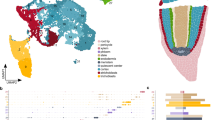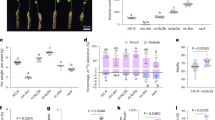Abstract
Fred, Baldwin and McCoy1 made the generalization that effective strains of Rhizobium produce few but large nodules, usually located on the upper root system of the host, whereas ineffective strains form numerous small nodules widely distributed over the root system. Subsequent detailed studies on the physiology of nodulation have been summarized by Nutman2, with a hypothesis relating nodule density on the root to the number of preformed foci, themselves determined by genetic factors affecting root morphogenesis. Dart and Pate3 recently reported studies concerning the effects of delayed inoculation on nodule production and position.
This is a preview of subscription content, access via your institution
Access options
Subscribe to this journal
Receive 51 print issues and online access
$199.00 per year
only $3.90 per issue
Buy this article
- Purchase on Springer Link
- Instant access to full article PDF
Prices may be subject to local taxes which are calculated during checkout
Similar content being viewed by others
References
Fred, E. B., Baldwin, I. L., and McCoy, E., Univ. of Wisconsin Studies in Sci., 5 (1932).
Nutman, P. S., Biol. Rev., 31, 109 (1956).
Dart, P. J., and Pate, J. S., Austral. J. Biol. Sci., 12, 427 (1959).
Author information
Authors and Affiliations
Rights and permissions
About this article
Cite this article
LANGE, R., PARKER, C. Nodulation Patterns on Legumes. Nature 186, 178–179 (1960). https://doi.org/10.1038/186178b0
Issue Date:
DOI: https://doi.org/10.1038/186178b0
This article is cited by
Comments
By submitting a comment you agree to abide by our Terms and Community Guidelines. If you find something abusive or that does not comply with our terms or guidelines please flag it as inappropriate.



